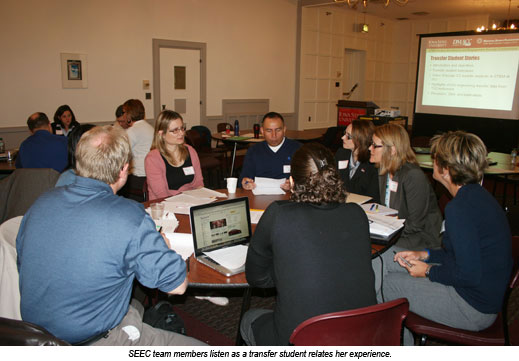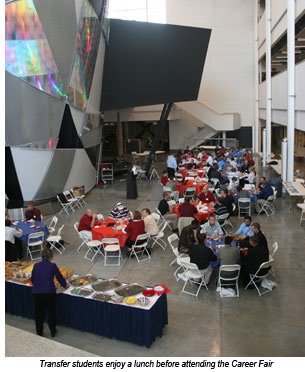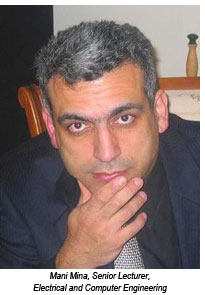E:TEC Scholarship Recipients Announced
The E:TEC scholarship program is now in its second year. Forty-one incoming engineering students from across Iowa were chosen to receive a one-time $500 merit-based scholarship. These students come from 33 Iowa counties, and as the E:TEC program continues to develop, the goal of attracting students from each of Iowa's 99 counties becomes closer to reality. The SEEC networking team and Iowa State Extension continue to work together to discover Engineering Talent in Every County.
SEEC ISU/DMACC Joint Workshop
SEEC team members from Iowa State and DMACC met in May to celebrate three years of project successes'and to plan for the future. Recruiting and retaining a diverse population of engineering students continues to be a primary focus of the project. Team members watched and discussed a clip from Freeman Hrabowski's presentation at the Diversity Fair. Next, Adin Mann, professor of mechanical engineering and assistant dean of the Graduate College, led a discussion on diversity data and measures.

The connection between Iowa State and DMACC as it relates to transfer students' experiences was the primary topic of the afternoon. Four Iowa State students who transferred from DMACC shared their stories with team members in roundtable discussions. These led to ideas for enhancing and improving the transfer experience and reinforced what was being done well. Everyone is looking forward to a successful year four.
The workshop was preceded by an internal advisory board meeting with members from both institutions' boards.
SEEC Team Presents at ASEE
Several SEEC team members attended the ASEE Annual Conference & Exposition in Louisville, Kentucky, in June. The SEEC project poster was included in the poster session, and two papers were presented as part of the overall program. These papers were "Experiences of Engineering Transfer Students: From Community College to University" by Frankie Santos Laanan, Dimitra Jackson, and Mary Darrow of Iowa State University; and "Educating Future Engineers: Role of Community Colleges" by Frankie Santos Laanan, Dimitra Jackson, Soko Starobin, and Mary Darrow of Iowa State University.
Engineering Admissions Partnership Program Now a Learning Community
The Engineering Admissions Partnership Program (E-APP) has been approved as a formal Iowa State learning community. Pre-engineering community college students who sign up for Iowa State's Admissions Partnership Program (APP) are invited to join the E-APP Learning Community. This virtual learning community connects students to Iowa State's College of Engineering faculty, staff, and students through multiple points of engagement.
One of these points is the E-APP online professional network. This site is moderated by transfer peer mentors'former community college students who transferred into engineering at Iowa State. Here transfer students connect with each other prior to transfer as well as meet Iowa State students and engineering faculty and staff. Peer mentors offer advice based on experience, answer questions, post information about events, and guide discussions. Students are also apprised of on-campus speakers and other general engineering events through the online professional network.
The E-APP also hosts events throughout the year to bring transfer students to campus. Each spring and fall E-APP students have the opportunity to attend a Transfer Students Career Fair event. And each spring they are invited to attend a Transfer Student Veishea Event. Engineering peer mentors, faculty, and staff are on hand at these and other events to meet with transfer students and answer their questions. In the coming year, incoming E-APP students will be invited to transition lunches to help them increase their connections on campus and in their departments.

E-APP students are assigned an Iowa State engineering adviser who can help them choose the courses they will need for their transfer. As one student stated, "E'APP was a really good experience. I was especially pleased that the program guided me to take only classes that would transfer to Iowa State.'
The goal of E-APP is to increase community college student engagement prior to coming to Iowa State and thus increase student retention and graduation rates of community college transfer students. In the 2009'2010 academic year, 142 students participated in the program. All of these students were assigned an academic adviser and transfer peer mentor. Eighty of these students participated in the E-APP online professional network in order to connect with Iowa State transfer peer mentors and learn more about engineering and the transfer process. Eighty-five of these students attended at least one event at Iowa State during the academic year. Forty-two of these students registered as full-time students in the fall 2009, spring 2010, or summer 2010 semesters.
'The SEEC project has allowed us to experiment with new strategies for increasing community college engagement,' Mary Darrow, SEEC project manager and coordinator of the E-APP Program, states. 'The online professional network pilot has been a learning experience for our E-APP students, and for the College of Engineering. We hope that our students will not only get connected to Iowa State through this network but will also gain valuable online networking skills that will advance their careers in the future. We will continue to experiment with and evaluate social and professional networking media through this program in order to increase transfer student engagement.'
DMACC's Engineering Orientation Class to Expand
Des Moines Area Community College (DMACC) is preparing to expand its successful Engineering Orientation (EGR 100) class. The class has been held at DMACC's Ankeny, Iowa, campus since spring 2008. In fall 2010 it will be offered at their Boone, Iowa, campus and at the Urban/Des Moines, Iowa, campus in spring 2011. 'Without the SEEC project, we would not have developed the course,' says Harry McMaken, math and engineering instructor at DMACC.
Iowa State faculty, staff, and graduate students have assisted in the development and instruction of this course since its inception. EGR 100 was originally developed with an emphasis on providing DMACC pre-engineering students who would be transferring to Iowa State's College of Engineering with information about the transfer process. It now includes more general information about the transfer process to meet the needs of those who will go into engineering at any four-year institution. However, the ties to Iowa State remain strong, as currently over 95% of the EGR 100 students transfer to Iowa State.
To that end, students are introduced to Iowa State's Admissions Partnership Program (APP), which connects them with an Iowa State engineering adviser and the specific Engineering Admissions Partnership Program Learning Community. Most EGR 100 students who will transfer to Iowa State take advantage of this program. 'The type of advising they can get through the program is invaluable in terms of helping them stay on track to graduation and earning an engineering degree,' explains McMaken.
EGR 100 provides students with a broad overview of the engineering disciplines and includes guest speakers from Iowa State and the industry as well as plant tours. 'We try to get them acquainted with all the options'there are so many areas of engineering they could become interested in,' states McMaken. 'I like the interaction with Iowa State and the guest speakers from there. Learning about the 2050 Challenge was a great way to learn about national and international things engineering is working on,' says Rachel Garrison, an EGR 100 student.
Students not only learn about engineering career opportunities but are given information about internships and co-ops they could participate in as students. A guest speaker explains behavioral-based interviewing to help prepare students for their interviews. The class also makes a trip to the Iowa State Engineering Career Fair each semester.
Broader transfer information includes material about financial aid and ways to finance an engineering education. Developing a transfer plan that encompasses both the student's graduation from DMACC and their plan for graduation from a four-year institution is a critical assignment in this course. Additionally, information about the differences in culture between DMACC and a four-year institution is discussed to help students make a smoother transition to a larger institution.
The course is also having a positive impact on the pre-engineering program at DMACC. The course makes students more aware of pre-engineering courses at DMACC, and enrollment in these classes has steadily increased since the advent of ENG 100. 'It's been a very, very positive class to add. We're confident it can run on other campuses and increase enrollment in pre-engineering courses there. It's here to stay,' concludes McMaken.
Connected!
Mani Mina, senior lecturer, electrical and computer engineering, has been connected to the DMACC EGR 100 class since its beginning in 2008. As one of the class' regular guest speakers, Mina demonstrates a few engineering concepts and conducts some experiments. More importantly, he shows students how engineering and the sciences are great vehicles for solving mysteries, learning how things work, and expanding their horizons. 'I do that by describing how great historical achievements in engineering and science have impacted our lives and what the possibilities are for the future,' explains Mina.

As a professor of an introductory engineering course at Iowa State, Mina has seen the struggles of transfer students entering Iowa State. And he has seen the positive impact EGR 100 and E-APP have had on this group. 'Before EGR 100 and E-APP, students who transferred from DMACC or other great programs often became disillusioned, felt left out, and felt down within the first term or so,' recalls Mina. 'EGR 100 and E-APP help students create a support group and a functional network, and get familiar with the two environments and the people. They can connect their lives at DMACC to Iowa State.' Mina has now seen some of the students he spoke to in EGR 100 in his advanced classes. He sees that they are more comfortable and having more fun than transfer students who had not experienced EGR 100 or E-APP. Mina summarizes the importance of these programs by saying, 'Every day, I see how transfer students are adapting well and doing much better than before these programs were in place. They're facing the challenges much more constructively because they have a good support group.'

